Table of Contents
How Do Wasps Eat?
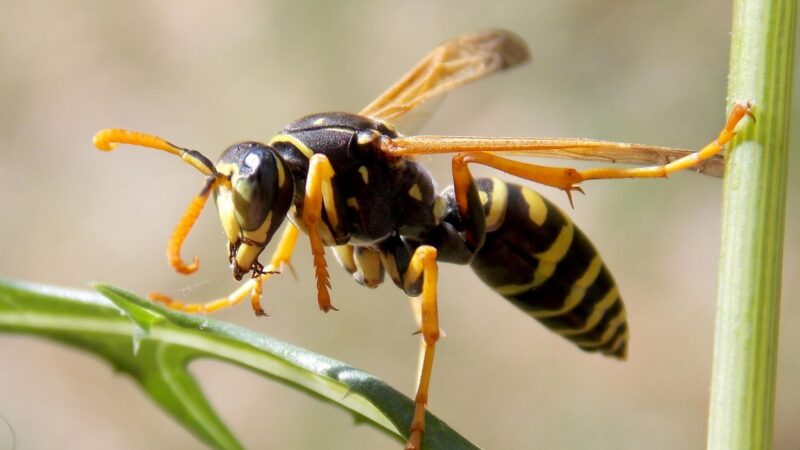
Looking at a wasp’s anatomy, wasps eat using their mouthparts for chewing. Compared to bees that have an elongated mouthpart that is primarily used for sucking, wasps have a mouthpart that’s specifically useful for biting. As such, wasps make excellent hunters that can efficiently chop smaller insects to feed their young.
But, what’s interesting is that adult wasps rarely feed on these small insects. Despite their strong choppers, adult wasps usually feed on sugary food like nectar and the sweet liquid produced by their larvae. And in turn, it’s the larvae that feast on small insects.
What Are Wasps’ Favorite Food?
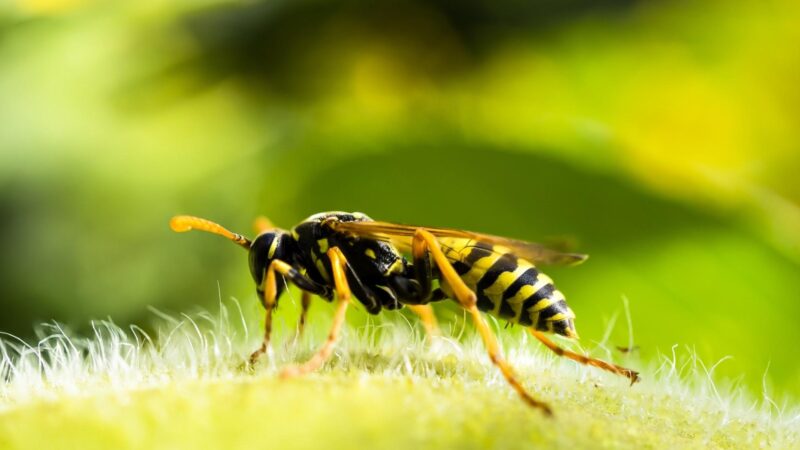
As earlier established, wasps are omnivores. Wasp larvae are fed with chopped insects hunted by the adults to provide them with a high-protein diet. While the adults are noted for their predatory behavior, they mainly feed on plant matter – such as fruits, honeydew, and nectar. This provides them with the energy they need to hunt for food.
Do Wasps Eat Wood?
Wasps do not eat wood. It has been observed that certain wasps, particularly paper wasps, munch on wood. White these wasps chew on wood, they only do so to help them create their nests.
As their name implies, paper wasps create paper-like nests from chewing wood. Wasps do this by scraping wood fibers and chips with their strong mouthparts and mixing them with saliva to create pulp. The pulp is then used to build their nests.
Do Wasps Eat Meat?
Wasps also consume meat. As omnivores, there’s no denying that wasps are not limited to eating fruits and other plant matter. Specifically, the yellowjacket subspecies prefer eating raw meat.
Do Wasps Eat Mosquitoes?
Wasps are not known to eat mosquitoes. While wasps prey on a variety of small insects, it seems that they do not consider mosquitoes as food. Instead, wasps mainly target garden pests such as ants, hoverflies, and spiders.
Do Wasps Eat Spiders?
Wasps eat spiders. While not exactly a small insect, spiders form part of a wasp larvae’s usual diet. They are stung and paralyzed by adult wasps and are then chopped into small pieces to be fed to their larvae.
Do Wasps Eat Fruit and Nectar?
Wasps eat fruit and nectar. In fact, adult wasps no longer feed on insects. They consume sugary food like fruit and nectar. This sweet food provides them with the energy they need to forage, hunt, and travel back to their nest while carrying their catch.
What Animals Eat Wasps?
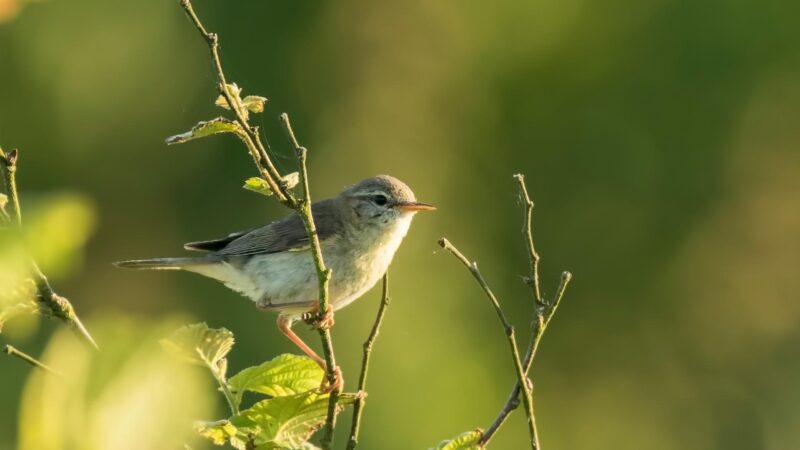
While wasps are considered predatory, they are not exactly apex predators. That means that they also become prey to bigger insects and animals. The animals that often prey on wasps include birds, black bears, rodents, and honey badgers, to name a few.
There are also recorded studies showing sibling cannibalism in young wasps. Thus, it follows that some wasps tend to eat other wasps for survival.
Do Birds Eat Wasps?
Birds are among the animals that eat wasps. Birds are known to feast on small insects and worms, and wasps are no exception. Particularly, notable wasp-eaters include cardinals, mockingbirds, swallows, and orioles, among others. Even the aptly-named bee-eaters also prey on the bee’s close relative.
Do Dragonflies Eat Wasps?
Dragonflies eat wasps. It may come as a surprise since dragonflies seem harmless – but this is only true for humans. In fact, dragonflies are carnivores that often feast on smaller insects.
While wasps are larger than most other insects, and their stingers make them difficult to prey on, that doesn’t stop a dragonfly from eating them. Dragonflies use their legs to scoop their prey and munch on them while in flight. This predator takes advantage of its impressive eyesight and stealthy flying skills to catch its prey by surprise. This often leaves wasps without much time to defend themselves.
Do Hornets Eat Wasps?
Hornets eat wasps. Hornets and wasps are closely related, both being part of the Vespidae insect family. But, this doesn’t stop the larger and bulkier hornet from preying on its smaller relative.
Also, hornets are known for being carnivores, although a small number of its subspecies eat fruits and nectar. These carnivorous hornets are the ones who prey on small insects, including wasps.
Do Wasps Do Anything Good?
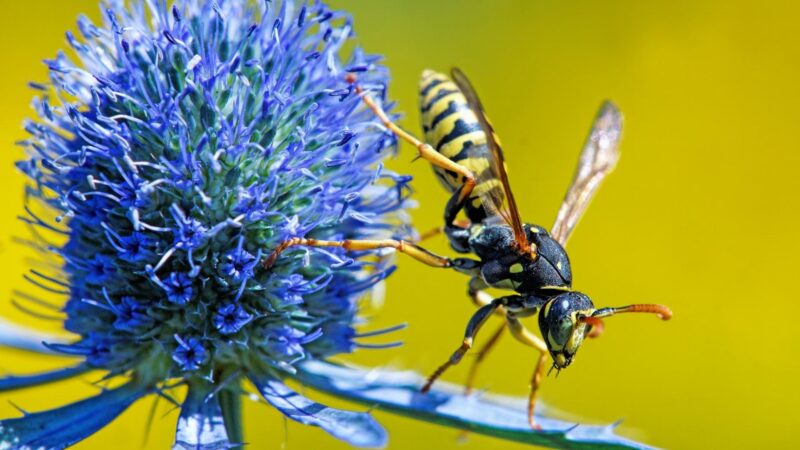
Wasps also contribute a great deal to improving the environment. While most people consider them pests, looking at how they live their lives will make you realize their contribution.
They get rid of garden pests. There’s no denying that wasps are predatory insects. Their common target includes ants, caterpillars, flies, and spiders – most of which are considered garden pests. As such, it’s easy to see that they make great natural pest control for your garden.
They are also pollinators. While wasps are not as excellent as bees when it comes to pollination, the fact that they also transfer pollen when they feed is undeniable. They may not have the hairy abdomen and legs that bees use to collect pollen, but their tongues are sticky enough to transfer pollen from one flower to another.
Do Wasps Pollinate?
Wasps are also known pollinators. They also transfer pollen from one flower to another when they feed. While they may not carry and transfer as much pollen as bees, they are still able to pollinate some plants. In fact, certain orchid species mainly rely on wasp pollination to flourish.
Why Are Wasps So Aggressive?
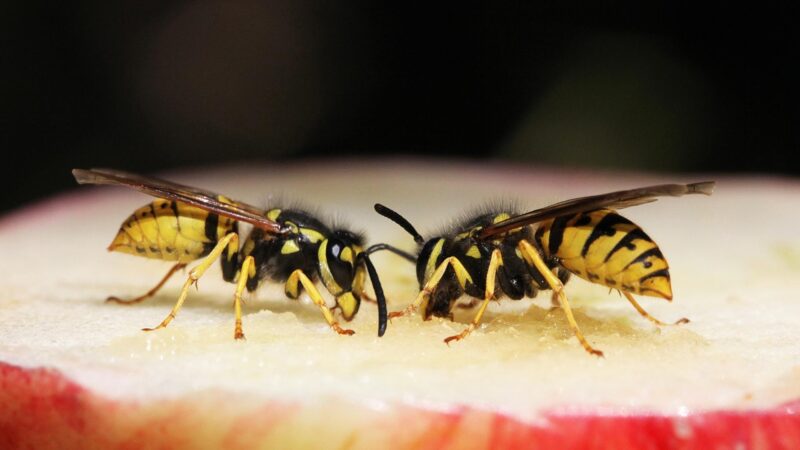
Wasps have a reputation for being aggressive. While wasps are predators, they do not sting or attack people for no reason. They usually do so as a defense mechanism – often when they feel threatened or attacked.
Unfortunately for the unsuspecting human, wasps are very territorial. Once a human comes close to its nest, it interprets it as an attack and immediately feels threatened. Even if the nest is well hidden and out of the human’s immediate reach, wasps will still attack since it’s within their territorial area.
What Do Wasps Hate?
Peppermint. While peppermint offers a relaxing minty scent, it’s surprisingly effective at keeping insects away – including wasps. Wasps find the scent too strong for their liking.
Sour scents. Wasps are naturally attracted to sweet-smelling items such as flowers and fruits. In contrast, they are repelled by sour scents such as vinegar.
Herbs. Aside from sour scents, wasps also hate the smell of herbs like thyme, mint, and basil to name a few. These herbs often emit a strong scent that even masks the sweet scents of other plants.
What Can I Spray to Keep Wasps Away?
Peppermint oil diluted in water. Wasps are repulsed by the smell of peppermint. To keep them off your property, you can spray peppermint oil diluted in water – especially around your home. The fact that peppermint smells great is a bonus.
Water and vinegar. Alternatively, vinegar diluted in water makes a strong wasp-repellent. If a wasp nest is nearby, you have to use a strong-smelling spray to keep them away. And since wasps hate sour-smelling vinegar, a water-vinegar spray will surely work wonders.
Citronella. It is a great insect repellent that also works for wasps. While wasps do not exactly find their scent repulsive, citronella effectively masks sweet scents. As such, solitary or foraging wasps may think that no food is nearby, so they won’t even bother to go near your property.
What Is a Natural Way to Get Rid of Wasps?
While wasps are considered pests, they play a role in maintaining a balanced ecosystem. As such, it’s best to steer clear of using harmful insecticides in getting rid of them. Instead, you may opt for any of these safe methods:
- Fake nest. Perhaps the easiest way to get rid of wasps naturally is to create a fake nest in your home or garden. Since wasps are highly territorial, they might think that other wasps have already established a home there. This will cause them to leave your property and establish a home elsewhere. To do so, you can simply fill a brown paper bag with air and tie it to your porch, tree, or any place where wasps may build their nest.
- Vinegar and water mixture. Spraying a mixture of vinegar and water will surely get rid of wasps since they hate the pungent smell of vinegar. But before you spray it directly to a wasp or its net, make sure you’re wearing protective gear to avoid getting stung.
Wasps have a bad reputation because of their aggressive nature. Fortunately, knowing what they love to eat will reduce your chances of an attack. As long as you don’t have sugary food on your picnic, they are not likely to invade your space. But even if you want to get rid of them, always remember that wasps help create a balanced ecosystem – so it’s best to leave them be.
List of Sources
Order Hymenoptera – Ants, Bees, and Wasps